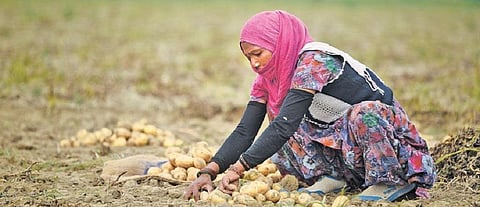

The Protection of Plant Varieties and Farmers’ Rights (PPV&FR) Authority December 3, 2021 revoked a PVP (plant variety protection) certificate granted to PepsiCo India Holding (PIH) on a potato variety (FL-2027) on multiple grounds.
This means that Pepsico’s Intellectual Property Right (IPR) granted on the potato variety in a PVP certificate in February 2016 will be taken back.
The application to revoke the certificate was filed by activist Kavitha Kuruganti of the Alliance for Sustainable and Holistic Agriculture June 11, 2019.
This was soon after the PIH withdrew the cases filed against farmers in Gujarat courts for growing “its registered variety”, under pressure from an intense public campaign.
This was the first time that IPR infringement cases on planting material were filed against farmers in India.
The certificate was revoked on multiple grounds. This included the following:
The revocation application was filed June 11, 2019 and the authority took almost 30 months in arriving at this conclusion. The company now has just about two months of the original registration time period left which was till January 31, 2022.
However, the registration certificate given to the company was renewable upto January 31, 2031, but now stands revoked.
Read:
“This judgement sets a precedent for all seed and food and beverages corporations and other registrants to not only uphold, but also more importantly, not to transgress the legally granted farmers’ seed rights and freedoms in India,” a statement by Kuruganti said.
Shalini Bhutani, legal researcher and IPR expert in agriculture and biodiversity called the judgement “historic”:
This judgement of the authority is significant and historic. It upholds farmers’ seed freedoms as contained in Section 39 of the PPV&FR Act, which makes this sui generis law of India truly unique.
Bhutani noted that the authority’s acceptance of the revocation application, including on grounds of being against public interest, sent an important signal that farmers’ rights were not to be taken lightly by IPR-holders in India.
“This should prevent further intimidation of farmers through vexatious IP lawsuits,” she said.
She added that the PPV&FR Act 2001 provides routine legal provisions for opposition to the IP registration at the time of grant of registration.
Meanwhile, Kuruganti noted that the interpretation of ‘public interest’ by the authority in its judgement was “very progressive” and was a victory for farmers in the country, especially of the potato farmers in Gujarat who strongly resisted Pepsi’s onslaught on their rights in 2019.
“Companies should not think that they are at liberty to harass farmers — we are watching and will disallow any such mischief. For us, any intimidation and harassment of farmers is clearly a matter of public interest,” she said.
Kuruganti hoped that the authority would proactively put into place all measures and mechanisms possible to ensure that farmers’ rights were not violated at any cost.